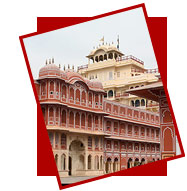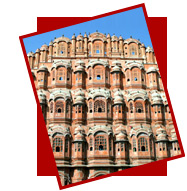Capital of Rajasthan also known as Pink City, surrounded
on all sides by rugged hills crowned with forts and enclosed by embattled
walls. Visit to City Palace which now houses a museum containing rare
manuscripts, paintings, and an armoury, the observatory with a sundial 90 ft
high, the museum is amidst the Ram Niwas Palace gardens founded in 1876 with
a large collections of antiques, the Palace of Winds, a landmark of Jaipur
made of Pink Sandstone and of unique design. Amber 12 Kms from Jaipur, lies
Amber with an old palace overlooking the lake at the entrance to rocky
mountain grove, built in 17th century, the palace is a distinguished
specimen of Rajput Architecture.
Sightseeing at
Jaipur City
Palace:
City
Palace: The magnificent City Palace is in the centre of the Pink City of
Jaipur, enclosed by high walls and set amidst fine gardens and courtyards.
Since it was built by Jai Singh in 1728 it has been the principal residence
for the Maharajas of Jaipur and the successive rulers have each added to it.
The major attractions in the palace are - Chandra Mahal, Mubarak Mahal,
Diwan-I-Khas, Dilkusha Mahal, Moti Mahal, Sheesh Mahal and Krishna Mahal,
all of which are adorned with exquisite colours and paintings.
Amber
Fort : Situated on the crest of a hill seven miles north of Jaipur is
Amber, capital of the Kuchwaha Rajputs from 1037 to 1728. The city-palace is
protected by towering outer walls, a further wall runs for miles along the
hills surrounding the palace. For many, the most memorable part of a trip to
Jaipur is the journey up the palace ramparts, through a succession of vast
gates, on the back of a painted elephant – Maharaja style. Inside are
the ruins of a once great palace, a wonderful example of Rajput
architecture, with Mogul influences.
Hawa Mahal : (Palace
of the Winds) Hawa is Jaipur’s most remarkable attraction. Built in
1799, it is situated on the edge of the City Palace complex overlooking one
of the city’s main streets and was constructed to offer the women of
the court a vantage point, behind stone-carved screens, from which to watch
the activity in the bazaars below. The five-storey building is shaped like a
crown adorning Lord Krishna’s head and contains over 900 finely
screened windows and balconies.
 Reaching
Jaipur - Air :
Reaching
Jaipur - Air : Well connected by air to Ahmedabad,
Aurangabad, Calcutta, Delhi, Jodhpur, Mumbai, Udaipur.
Rail :
Well connected to Delhi, Ajmer, Ahmedabad, Abu Road, Jodhpur,
Chittorgarh, Indore, Bikaner, Udaipur by its own railhead.
Road
: Jaipur is well connected to all major towns of India by road.
Shopping
in Jaipur - Jaipur is famous for precious and semi-precious stones,
leather goods (camel-skin), textiles (tie & dye) and handicrafts. The
major markets in Jaipur are along Jauhari Bazaar (jwellery), Bapu Bazaar and
Nehru Bazaar (textiles), Chaura Rasta, Tripolia Bazaar and M.I. Raod
(emporiums). Ramganj bazaar is famous for shoes and Tripolia Bazar for lac
bangles. Jaipur is alive with bright and lively colours ....go get some.







 City
Palace: The magnificent City Palace is in the centre of the Pink City of
Jaipur, enclosed by high walls and set amidst fine gardens and courtyards.
Since it was built by Jai Singh in 1728 it has been the principal residence
for the Maharajas of Jaipur and the successive rulers have each added to it.
The major attractions in the palace are - Chandra Mahal, Mubarak Mahal,
Diwan-I-Khas, Dilkusha Mahal, Moti Mahal, Sheesh Mahal and Krishna Mahal,
all of which are adorned with exquisite colours and paintings.
City
Palace: The magnificent City Palace is in the centre of the Pink City of
Jaipur, enclosed by high walls and set amidst fine gardens and courtyards.
Since it was built by Jai Singh in 1728 it has been the principal residence
for the Maharajas of Jaipur and the successive rulers have each added to it.
The major attractions in the palace are - Chandra Mahal, Mubarak Mahal,
Diwan-I-Khas, Dilkusha Mahal, Moti Mahal, Sheesh Mahal and Krishna Mahal,
all of which are adorned with exquisite colours and paintings. Reaching
Jaipur -
Reaching
Jaipur -